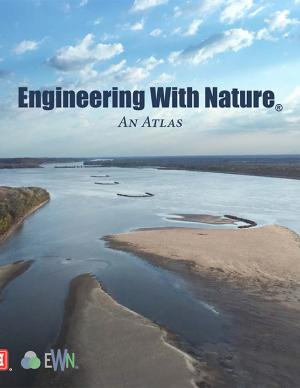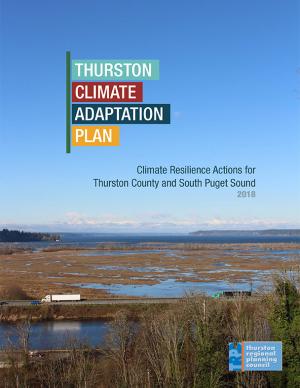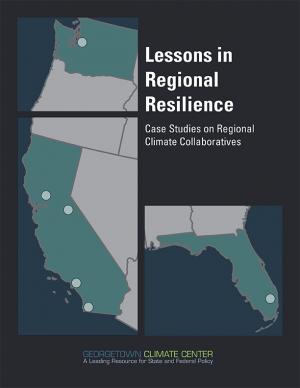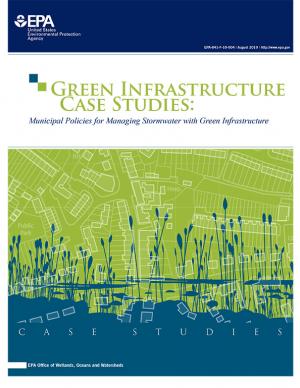Access a range of climate-related reports issued by government agencies and scientific organizations. Browse the reports listed below, or filter by scope, content, or focus in the boxes above. To expand your results, click the Clear Filters link.
The EWN Atlas is a collection of 56 projects illustrating a diverse portfolio of contexts, motivations, and successful outcomes, presented and considered from an Engineering With Nature® perspective to reveal the usefulness of nature-based approaches and the range of benefits that can be achieved. Engineering With Nature is an initiative of the U.S. Army Corps of Engineers enabling more sustainable delivery of economic, social, and environmental benefits associated with water resources infrastructure. EWN intentionally aligns natural and engineering processes to efficiently and sustainably deliver economic, environmental, and social benefits through collaborative processes.
The goal of this concerted effort is to help Thurston County (Washington) and the broader South Puget Sound region prepare for and adjust to climate change. The Thurston Regional Planning Council crafted this document with a $250,000 National Estuary Program grant from the U.S. Environmental Protection Agency and significant in-kind support from the community. Partners included representatives from tribes, municipalities, universities, nonprofits, businesses, and other entities within the project area: three geographically diverse watersheds (Nisqually, Deschutes, and Kennedy-Goldsborough) within Thurston County that drain into Puget Sound. The watersheds encompass beaches, rivers, lakes, wetlands, highlands, forests, farms, ranches, cities, towns, and tribal reservations. It is the Council's hope that other communities throughout the Puget Sound region, state, and nation will replicate this project’s science-based assessments, innovative public-engagement efforts (including development of a resilience game), collaborative planning processes, economic analyses, and comprehensive actions.
This report is part of a series of six case studies that explore lessons that are being learned by climate collaboratives from around the United States that are bringing together local governments and other stakeholders at the regional level to both reduce carbon pollution (mitigation) and prepare for the impacts of climate change (adaptation). Each case study explores the history and development structure and decision-making methods, funding sources, roles, and initiatives of each of these climate collaboratives. A synthesis report also explores lessons that can be learned by comparing the efforts of each collaborative on climate policy in their regions. These case studies were supported by a grant from the Kresge Foundation. In developing these case studies, the Georgetown Climate Center collaborated with the Alliance of Regional Collaboratives for Climate Adaptation (ARCCA).
King County, Washington's Strategic Climate Action Plan sets forth strategies for reducing greenhouse gas emissions and preparing for climate change impacts.
Find out how hometowns across the United States are building their resilience to climate change. Two women who studied climate change science and policy in graduate school took a three-month road trip to find out what climate change adaptation looks like in the United States. They visited more than 30 communities preparing for climate change and documented what they learned in blogs and through media reports. This report describes six big lessons from the ongoing adaptation work they saw across the country.
These guidelines—which include climate change and sea level rise considerations—were developed to provide a comprehensive framework for site assessment and alternatives analysis to determine the need for shore protection and identify the technique that best suits the conditions at a given site. There are many guidelines and manuals for the design of "protection" techniques for the more typical open coast, but prior to the Marine Shoreline Design Guidelines (MSDG) there was almost no guidance that reflected the variety of conditions found in Puget Sound. For this reason, the MSDG were created to inform responsible management of Puget Sound shores for the benefit of landowners and shared natural resources.
Preparation of the Strategic Climate Action Plan is an opportunity to take stock of progress related to climate change, to look forward, and to plan for the future.
In determining appropriate adaptation strategies, project staff worked with participants to survey a wide range of potential strategy options and develop a process for evaluation and prioritization of targeted strategies.
This report presents the common trends in how 12 local governments across the country developed and implemented stormwater policies to support green infrastructure. The local policies examined include interagency cooperation, enforcement and management issues, and integration with state and federal regulations. While a strong motivation for these policies and programs is innovation in stormwater management, many communities are moving past the era of single objective spending and investing in runoff reduction and stormwater management strategies that have multiple benefits. Green infrastructure approaches have a range of benefits for the social, environmental, and economic conditions of a community. Not only do these case studies include success stories for building a comprehensive green infrastructure program, but they also provide insight into the barriers and failures these communities experienced while trying to create a stormwater management system that includes more green infrastructure approaches.
King County in Washington State has established a comprehensive program to prepare for climate change, and many of the tools and strategies that King County has employed can be applied in other communities. This memorandum from the King County Office of Strategic Planning and Performance Management, published by the American Planning Association, describes strategies developed in King County to direct local government efforts to address climate change.
This Executive Order requires that King County, Washington, municipal departments employ coordinated strategies of land use to mitigate and adapt to global warming.














